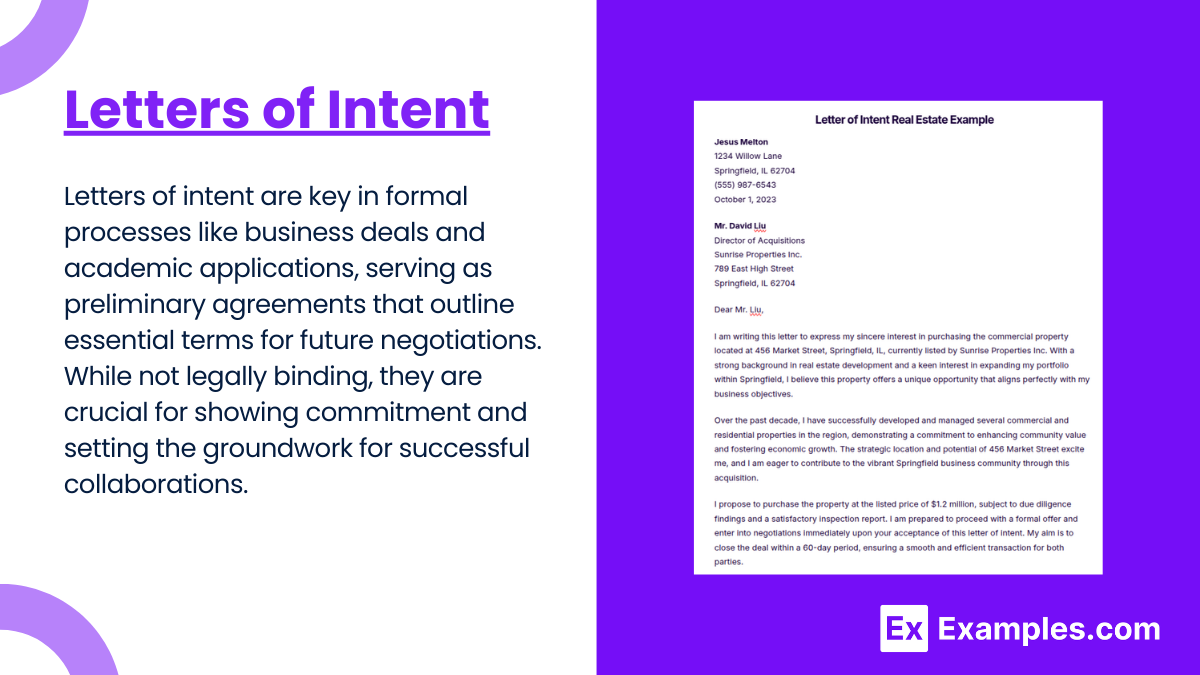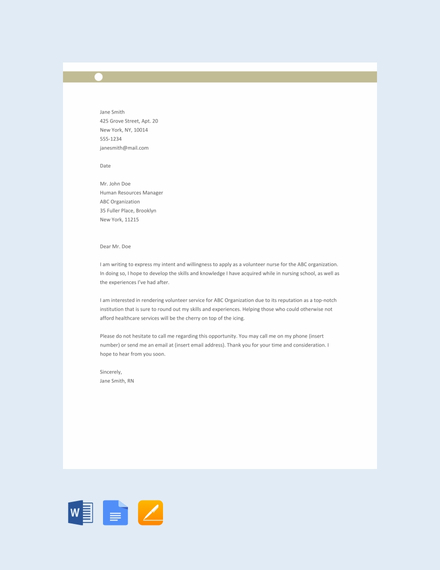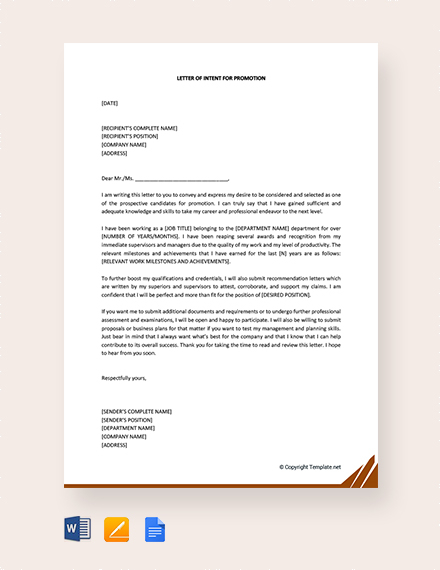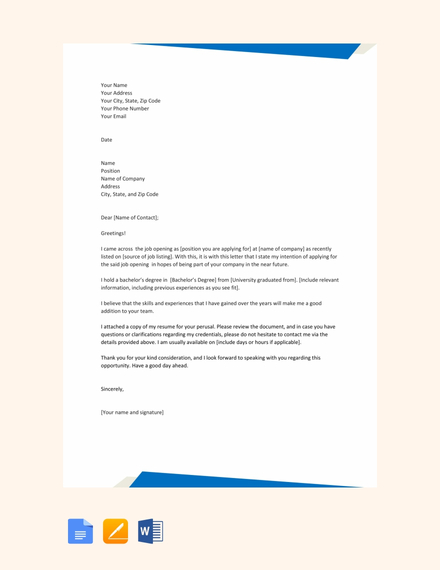35+ Letter of Intent Examples to Download
Letters of intent play a crucial role in various formal processes, from business transactions to academic applications. They serve as a preliminary agreement between two parties before finalizing a contract. In essence, a letter of intent outlines the key points of an agreement or a project, providing a foundation for future negotiations. It’s not legally binding but acts as a significant gesture of commitment. Understanding what to include in these letters and how to craft them effectively can help you communicate your intentions clearly and set the stage for successful collaborations.
What is Letter of Intent?
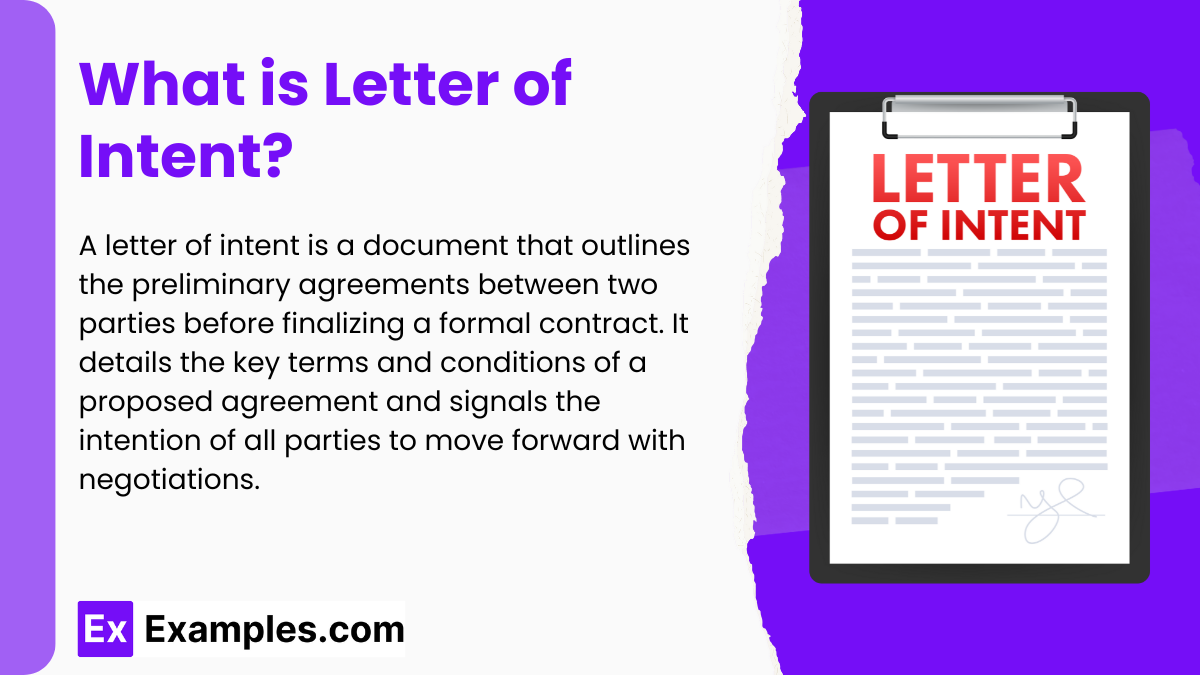
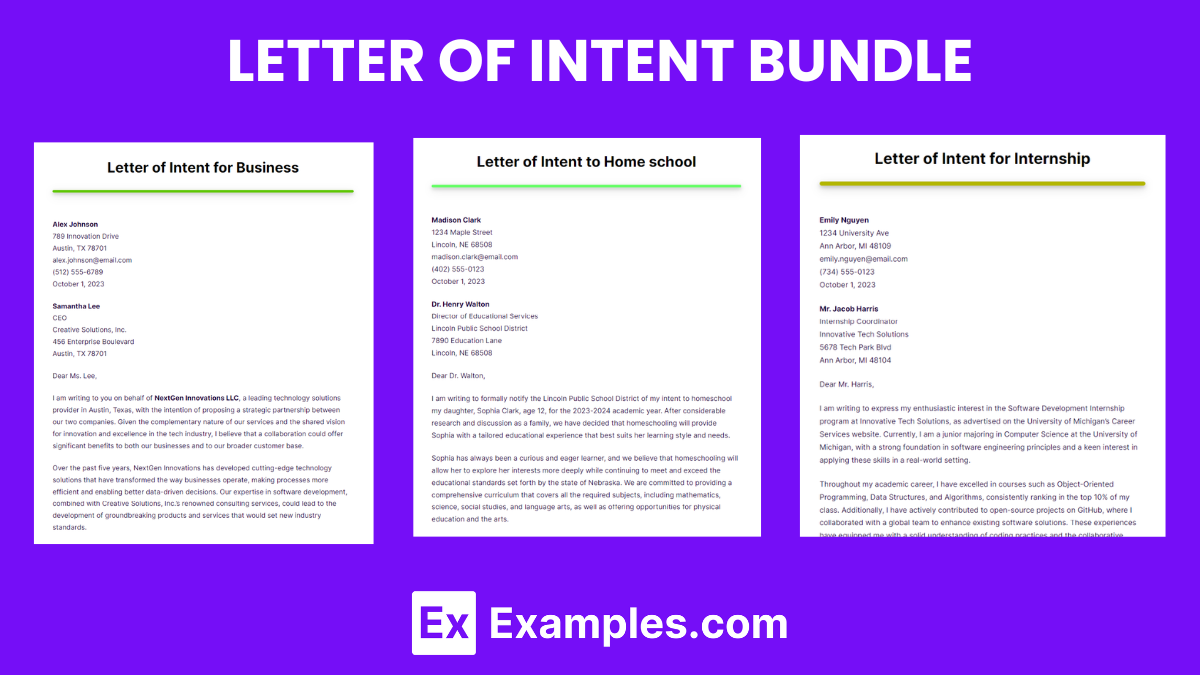
Download This Letter of Intent Bundle
Letters of Intent Format
Heading
Include your name, address, city, state, zip code, email address, and phone number at the top of the letter. Add the date, followed by the recipient’s name, title, organization’s name, and address if known.
Salutation
Start with “Dear [Name]:” if you know the recipient’s name. If not, use “Dear Hiring Manager:” or “To Whom It May Concern:.”
Introduction
State the purpose of your letter clearly. Mention the type of agreement or transaction you are proposing. Briefly introduce yourself, highlighting your current role or relevant background.
Body
Express your interest in the opportunity and explain why you are a good fit. Detail your relevant experience and skills, providing specific examples that show your abilities and how they align with the goals of the proposed agreement. Explain what you hope to achieve by this agreement and how it fits into your strategic goals. Conclude with a reiteration of your interest and enthusiasm for the opportunity. State your availability for further discussions or finalizing the agreement.
Closing
Thank the recipient for considering your proposal and conclude with a professional closing like “Sincerely,” followed by your name.
Letters of Intent Example
John Doe
123 Business Rd.
Business City, CA 90001
Email: johndoe@email.com
Phone: (555) 555-5555
Date: January 29, 2025
Jane Smith
Director of Business Development
Innovative Solutions Ltd.
456 Partner St.
Industry City, CA 90002
Dear Ms. Smith:
I am writing to express my company, Doe Enterprises, interest in forming a strategic partnership with Innovative Solutions Ltd. As a leading provider in IT solutions, we believe that a collaboration between our two companies can lead to significant advancements in the tech industry. My role as CEO of Doe Enterprises has given me a broad perspective on the potential synergies between our operations.
Our company has been an industry leader in software development for the past decade, consistently delivering high-quality solutions that enhance productivity and efficiency. Our expertise in cloud-based technologies complements the innovative products that your company has brought to market.
The purpose of this letter is to propose a formal discussion between our key teams to explore potential areas of collaboration. We are particularly interested in co-developing a suite of integrated tools tailored for the healthcare industry, a new market segment for both our companies.
We believe that combining our technical capabilities and market reach can dramatically increase our competitive edge and provide substantial value to our customers. I am confident that our shared commitment to innovation and excellence forms the perfect foundation for this partnership.
Thank you for considering this proposal. I am looking forward to your positive response and am available for a meeting at your earliest convenience to discuss this exciting opportunity further. Please feel free to contact me directly at (555) 555-5555 or via email.
Sincerely,
John Doe
CEO, Doe Enterprises
35+ Letter of Intent Samples
Letter of Intent Examples
Letter of Intent Example
Free Letter of Intent for Promotion
Letter of Intent for Job Opening Template
Letter of Intent Sample
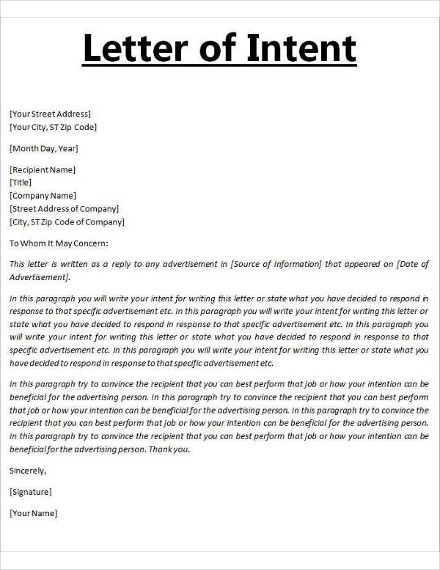
Types of Letter of Intent
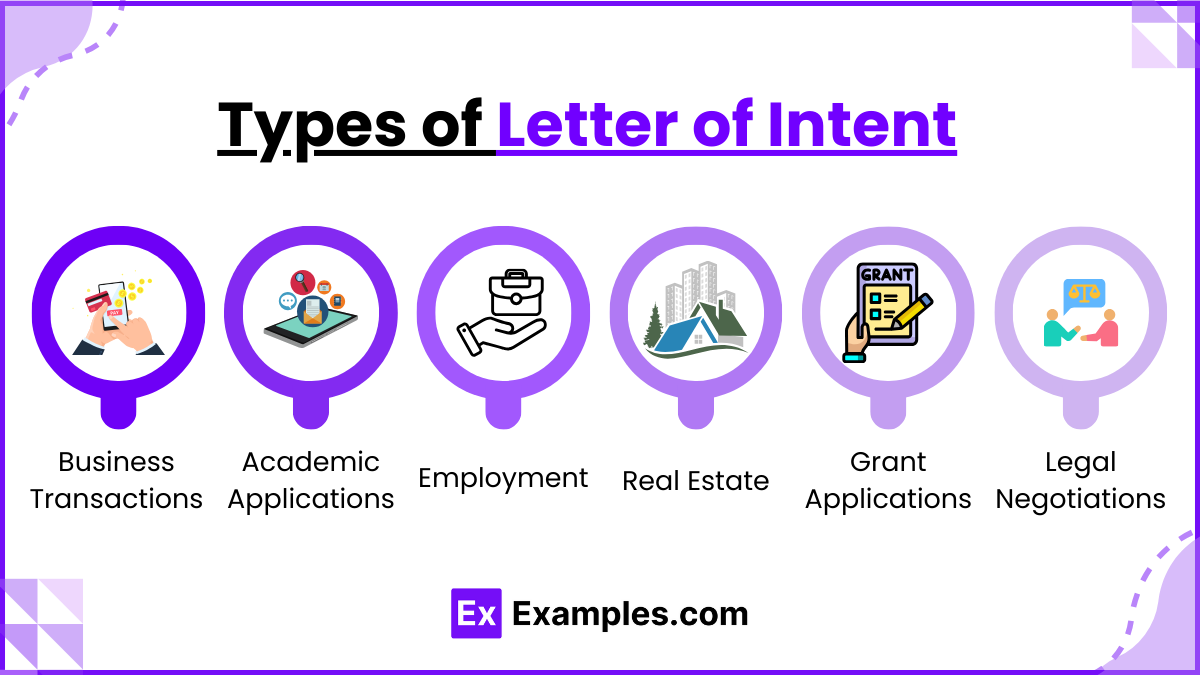
Business Transactions
Letters of intent for business transactions are used to outline preliminary agreements for mergers, acquisitions, joint ventures, or other types of business collaborations. They specify the key terms before drafting the formal contracts.
Academic Applications
Often used in academic settings, these letters outline a candidate’s intention to attend a particular institution or program. They may include the applicant’s objectives, background, and reasons for choosing the institution.
Employment
These letters are similar to cover letters but are often more formal and specific, indicating an individual’s intent to apply for a position within a company, expressing interest, and summarizing the applicant’s qualifications.
Real Estate
In real estate, a letter of intent is used to express interest in leasing or purchasing property. It serves as a preliminary agreement on terms and conditions before a formal lease or purchase agreement is made.
Grant Applications
Used primarily by non-profits and research institutions, these letters outline the intent to apply for funding, detailing the purpose of the grant and how it aligns with the funder’s objectives.
Legal Negotiations
In legal contexts, a letter of intent may be used to outline the terms of a settlement agreement before finalizing the legal documents. It shows both parties’ willingness to agree to certain terms in principle before formalizing the agreement.
How to Write an Letter of Intent
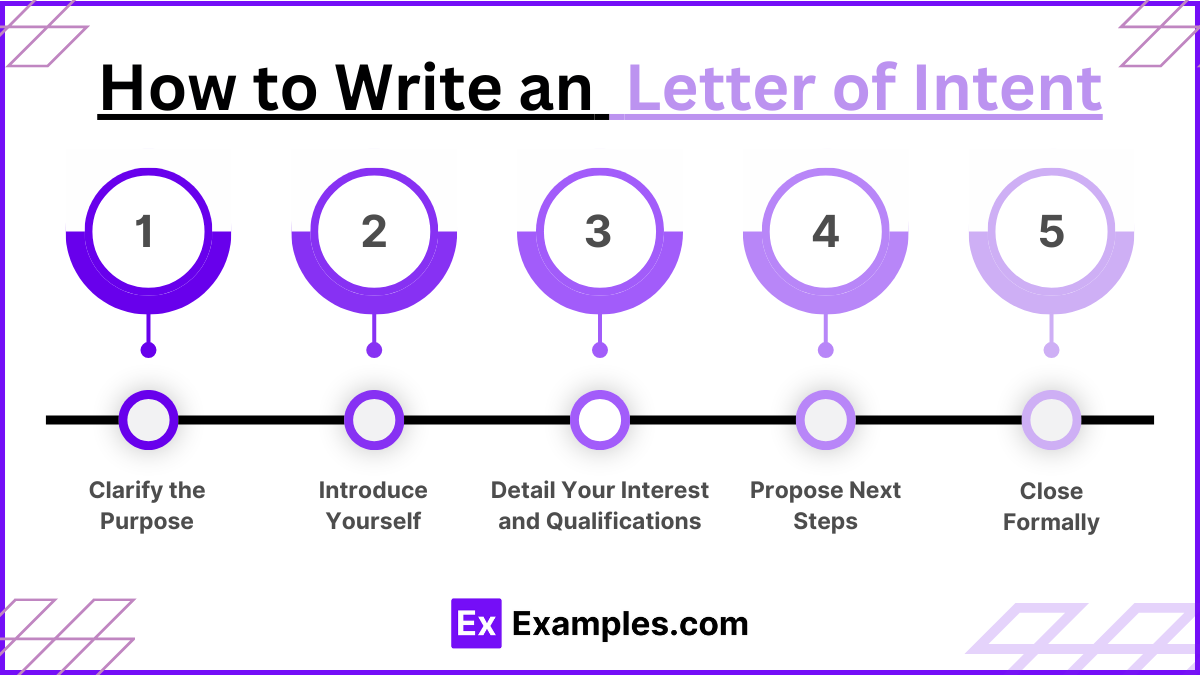
- Clarify the Purpose: Begin by stating the purpose of your letter clearly and concisely. Identify the specific intent, whether it’s applying for a job, proposing a business transaction, or expressing interest in an academic program.
- Introduce Yourself: Provide a brief introduction that includes your background relevant to the intent of the letter. Highlight your qualifications or experiences that make you a suitable candidate for the position, partnership, or opportunity.
- Detail Your Interest and Qualifications: Go into more detail about why you are interested in the position, program, or agreement. Describe what you bring to the table and how it benefits both parties. Include specific examples that demonstrate your skills and accomplishments.
- Propose Next Steps: Suggest a follow-up action, such as a meeting or further discussion. Indicate your availability to engage in the next steps of the process to move forward with the intent expressed in your letter.
- Close Formally: End the letter on a polite note, thanking the recipient for considering your proposal or application. Include a professional closing with your contact information, making it easy for the recipient to reach out to you.
How to Draft a Letter of Intent
Since a letter of intent involves essential business transactions, it is vital to take meticulous care when creating it. There are a few essential elements that writers should make sure when putting together a letter of intent.
1. Make the Summary Statement
To make your summary statement think about these questions. Who wants to do what? How much is requested? Is this a portion of a more considerable project cost? The answers should be able to stand on its own, and if the reviewer reads nothing else, they should know what you want to do from reading this paragraph.
2. Write the Reason For This Letter
Write about the issue that you want to address in your letter of intent. Explain why you have chosen to respond to this set of points in the way that you have. For example, if you are a student seeking to transfer to another university, then indicate your reasons for the letter of intent.
3. Share Your Credentials
Whether this is for a job application or a business proposal, add them to your letter of intent’s content. Sharing your credentials will give your message a strong impression to your reader and convince them to reach out to you a lot sooner. Brag with substance by indicating awards, rankings, and tangible measures that set you apart from your peers.
4. Make a Strong Closing
Offer any additional information the reader might need, including a contact name and contact information. Express appreciation for the reader’s attention or the opportunity if it is in response to them.
Tips for Writing Letter of Intent
- Be Specific: Tailor your letter to the specific situation or opportunity. Avoid generic statements and instead, mention specific details about the company, program, or project you are writing about. This shows that you have done your research and are genuinely interested.
- Keep It Concise: While it’s important to include detailed information, keeping your letter concise and to the point is equally crucial. Aim for no more than one page, ensuring that every paragraph serves a clear purpose and contributes to your overall message.
- Use a Professional Tone: Maintain a formal and professional tone throughout the letter. This conveys seriousness and respect for the recipient. Avoid overly casual language and slang.
- Highlight Key Points: Emphasize the most important qualifications, experiences, or contributions you can offer. Use bullet points if necessary to make these stand out, ensuring that the recipient can see at a glance why you are a strong candidate.
- Proofread: Errors can detract from the professionalism of your letter and may lead to misunderstandings. Proofread your letter several times, and consider having someone else review it to catch any mistakes you may have overlooked.
FAQ’s
How Serious is a Letter of Intent?
A Letter of Intent (LOI) is quite serious as it reflects a commitment to proceed with negotiations or a transaction. It outlines preliminary agreements and intentions, laying the groundwork for formal contracts.
Is a Letter of Intent Worth Anything?
Yes, a Letter of Intent holds significant value. It demonstrates mutual interest and commitment to move forward, serving as a foundational document for further negotiations and planning.
Does Letter of Intent Mean Offer Letter?
No, a Letter of Intent is not the same as an offer letter. An LOI indicates a general commitment to a deal or negotiation, while an offer letter is a formal job proposal outlining specific terms of employment.
Is it possible for a Letter of Intent be legally binding?
Parties involved may want the letter of intent be a legally binding contract. However, details of most transactions usually are not discussed until the drafting of a full agreement, which means that the parties should be careful. It is better than legally binding letters of intent only to be used if necessary.
Is there a time limit for a letter of intent?
Yes, a letter of intent usually takes around 72 to 96 hours for it to be valid in its use. This is typically a rule in a business or school setting when it comes to matters of job applications or scholarships.
Can I change my mind after I signed a letter of intent?
Only if it is legally binding, letter of intent is usually informal, however. But if it is not the case, it is possible to appeal for your release from its clause. You must do this, especially if you are in a professional setting, so that it is all sorted out properly.


